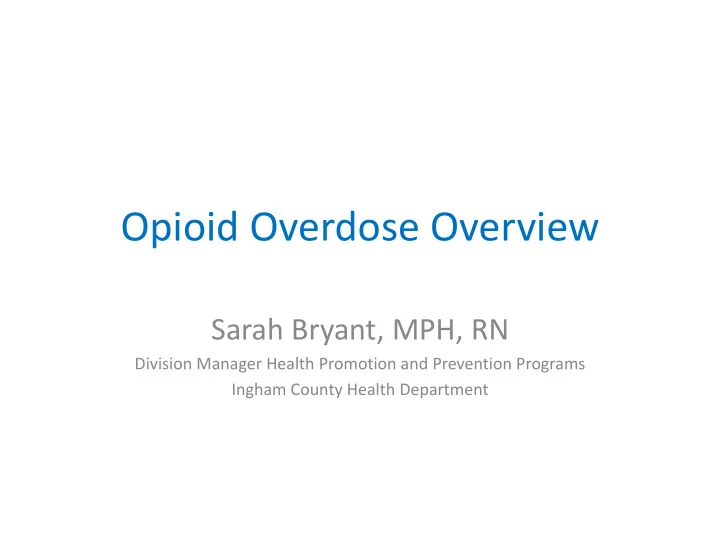

Opioid Overdose Overview Sarah Bryant, MPH, RN Division Manager Health Promotion and Prevention Programs Ingham County Health Department
Learning Objectives • Importance of opioid use and abuse • Decreasing opioid overdose deaths • Reducing stigma • Increasing education
Burden of Opioid Abuse
Real Life Gina from Portland, Ore. “While it is a personal choice to use, it is also a way of self-medication for other issues such as stress, mental illness, and low self-esteem. Just relying on rehab or detox does nothing for those who haven't been able to make good life choices their entire lives. Some need support that lasts years, if not their entire lives.” (Frontline)
Are opioids just opioids?
Educating Staff to….. • Understand addiction • Know how to respond to overdose • Know when to administer naloxone • What to do after the overdose • Stigma • Resources
Why Do People Overdose From Opioids?
Risk Factors for Overdose 1. Mixing 2. Tolerance 3. Quality 4. Using Alone
Signs and Symptoms of Overdose • Is the person non-responsive? • Is their breathing shallow or slow? • Are they pale or blue? • Are they snoring or gurgling?
S.C.A.R.E M.E. • Stimulation • Call for help • Airway • Rescue Breathing • Evaluation • Muscular Injection/ Intranasal Administration • Evaluate Grand Rapids Red Project
Naloxone Education • What is Naloxone and how does it work? – It takes 3-5 minutes to work – Naloxone last 30-45 minutes so it is important to keep the person who overdosed from using again.
Reducing the Stigma, Dispelling the Myths
Myth #1 • The Availability of Naloxone will Encourage Abuse by Drug Users because They will be More Likely to Take Larger Doses if They Know Naloxone is Available.
Myth #2 • Drug Users and Other Lay People Are Not Medically Trained and Will Be Unable To Administer Naloxone
Myth #3 • Naloxone Distribution Will Discourage People From Seeking Drug Treatment
Stigma
Thank you Sarah Bryant, MPH, RN sbryant@ingham.org 517. 887.4421
Recommend
More recommend